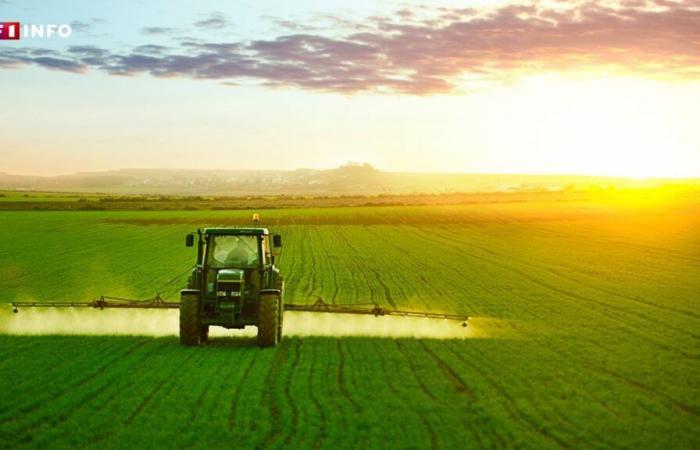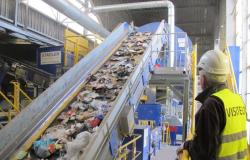
Organic farmers demonstrated on Thursday to denounce the contamination of their crops by this very volatile herbicide.
A significant shortfall for this sector, already in crisis.
The government announces that it is considering a compensation system for impacted professionals.
Follow the full coverage
Agriculture under tension: anger rumbles again
The subject is hot for the organic sector. Thursday, November 28, farmers mobilized, at the call of the National Federation of Organic Agriculture (FNAB), to alert on a complex situation: contamination of their crops by prosulfocarb, a very volatile herbicide widely used to treat cereals and potatoes in conventional agriculture. In a press release (new window)the FNAB ensures that the pesticide “regularly contaminates non-target crops such as buckwheat which, to be ripe, is harvested in autumn, very often at the time of treatments by non-organic farmers”.
-
Read also
Nitrates and pesticides in the basement: in Charente-Maritime, the unpleasant surprise of a mayor who wanted to go organic
“For four years, organic producers have been calling on the various Ministers of Agriculture and ANSES about the risks of contamination associated with prosulfocarb, as well as the financial losses that it causes. Despite this, the authorization of the molecule is not questioned and no farmer has been compensated”, points out the Federation which estimates that since 2018, more than 400 organic crops have been contaminated north of the Loire, particularly in Île-de-France and the Grand Est.
According to the same data, in these sectors, between 2020 and 2022, 140 farms would have been affected for more than 550 tonnes of buckwheat and a loss estimated at 550,000 euros, while the data at national level is not known. And organic farmers fear this year 2024: with the precipitation, “half of organic buckwheat was not harvested in 2024”, while “most of the prosulfocarb treatments had already taken place.”
We've been fooled for 4 years, it can't go on any longer
Philippe Camburet, president of the FNAB
“Today, if we want our buckwheat to be collected, we must prove that it has not been contaminated by having toxicological analyzes carried out at our expense,” explains in the press release Loïc Madeline, producer of organic buckwheat in Normandy. “It’s a terrible loss of income for farmers, François Veillerette, spokesperson for Générations futures, explains to TF1info. When their products are contaminated, they can no longer sell organic with prices, in fact, lower than those they could have charged.
If the contaminations are so significant, it is because prosulfocarb is a particularly volatile herbicide. “It is impossible to control. It is so volatile that it is found in the air all year round, until July while treatments take place around October”further details François Veillerette who assures that analyzes revealed the presence of the product “to the center of the city of Lille”.
Faced with these data, in 2023, the health security agency Anses required farmers using the herbicide to respect a buffer zone of at least 10 meters with residential areas and to reduce dosages. But for the FNAB, these distances are ineffective due to the extreme volatility of the substance, which it calls for to be banned outright. The Federation has also initiated, with Générations futures, an appeal to request the withdrawal of market authorization (new window) pesticides containing prosulfocarb.
In the meantime, professionals in the sector are appealing to the State. “Last year we were promised compensation with the increase in taxes on pesticides and finally everything disappeared with the agricultural mobilizations. We have been fooled for 4 years, this can't continue.” deplores to AFP Philippe Camburet, president of the FNAB and Burgundian producer of contaminated buckwheat.
The delicate question of compensation
Contacted, the Ministry of Agriculture admits that “contamination is a common concern for all producers, whether in organic or conventional agriculture”. He recognizes that “farms may be confronted with various cases of contamination, affecting soil, air and water, with impacts that may be more significant for organic farmers.” Faced with these questions, the ministry identifies two issues: “The prevention and management of these risks and the question of compensation for the producers concerned”.
Thus, a general inspection mission, as part of the Ecophyto 2030 strategy project, must be launched “shortly” pour “study possible options to compensate organic producers faced with losses due to various contaminations”, indicates the Ministry of Agriculture to TF1info. He also wishes “provide farmers with information on the management measures to put in place to protect themselves or act when their farm is confronted with contamination”.
Authorized in France since 1990, prosulfocarb is today the second most sold active substance, behind sulfur and ahead of glyphosate. At the European level, its authorization has been extended until the end of January 2027, time for the state responsible for reevaluating the product, Portugal, to complete its work.





